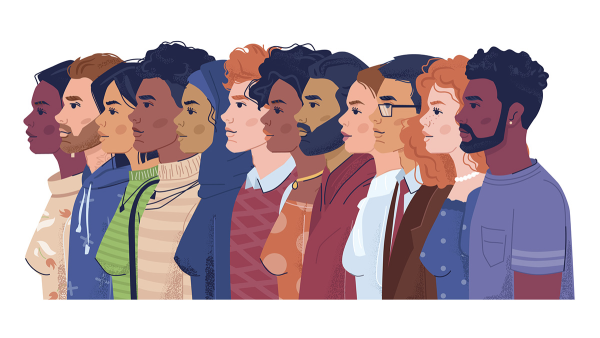Sights Set
Exploring the lives of students in the medical field
With the tip of their index finger, the doctor grabbed the contact lens, opening up their eye to demonstrate.
“I know it’s uncomfortable to learn this, but you’ve got it,” the doctor said.
The patient in front of them quivered, hand shakily reaching for the lens. It was just a demonstration, but it was still scary. They decided they wanted to start wearing contact lenses instead of glasses. However, in making this decision, they didn’t expect to be shown how to properly put it in by their classmate.
Seniors Avery Mitchell and Reneigh Gillis each have jobs at the Fairfield Strong Vision Center because of the Bridgeland work studies program.

The work studies program is a way for high school students to get real-life medical experience before heading into the career as a professional. Denise Bishop, the principles of health sciences teacher and head of the work studies program, started the program three years ago. After the first year, the Strong Vision Center has requested that Bridgeland students join their office every year.
“The first year that I started teaching practicum, Dr. Strong was actually a guest speaker at our HOSA meeting, and I talked to her about it – if she might be interested in having some students one day and she said she would absolutely love to,” Bishop said, “We did a little trial. We had about two students, and she loved them.”
After a normal school day of five classes Mitchell and Gillis head to their jobs that start at 1:55 p.m. While there, they work with machines, do pretesting, help the receptionists, and take patients back to begin their eye exams. However, to both Mitchell and Gillis, the best part about working there is their coworkers.

“They’re always uplifting like if you’re having a bad day, or if they know you’re struggling with something, they’ll, they will always like to ask you if you’re doing okay or try hyping you up in any way that they can,” Gillis said.
Bishop is in charge of recommendations for this program. Before school ends, students must fill out an application for the program. From there, they interview with the owner of the center, and if all goes well, they are hired. For high school students, training begins in summer. This gives them enough time to train in the field.
“[Dr. Strong] contacted me beginning in about March or April, saying, ‘give me a new list of students’,” Bishop said. “Every year she’s taken more and more kids.”
Usually, the duo is expected to work with six or seven patients a day, and 23-25 hours a week. Sometimes, they even work on their own peers. When bringing patients to the back for examinations, they are required to wash their hands and wear a mask. Despite Mitchell enjoying the patients he works with, this step is where things can get aggravating for him.
“People who just disagree with the medical field, [saying] that it’s just a scam or disagreeing with the masks and not wearing them [make the job tough],” Mitchell said. “Most people are nice, and I don’t get mad at any other people for being nice because everyone has their own problems in life. If they’re being rude, then that means there’s something going on in their [personal] life.”
Because the duo are high schoolers, they tend to be underestimated in their field. According to Micthell, he has had patients tell him that he is doing his job incorrectly even though he is licensed and educated in the field of orthopedagogy.

“Older patients that come in, [say] ‘you’re a little young to be doing this,’ but whenever they find out younger people are getting into the medical field, they start getting a little more curious and they’re like, ‘oh, okay, there’s more people interested in doing this as a career.’” Gillis said.
Typically, each day for them ends at 6 p.m. However, on Tuesdays, they close at seven p.m., and on weekends, they work 9a.m. to 3p.m. For Mitchell, who, at his old job, went to bed at 11 p.m., now goes to sleep at 9:45 p.m. at the latest. This gives him enough time to do homework so that he isn’t stressed or feeling behind on content.
“We sent her the very best of [our] kids – kids that I would trust representing Bridgeland,” Bishop said, “but also, kids who are eager to learn and that have a passion for going to work in a healthcare job one day.”
Junior Ashtyn Haggard is a reporter and news section editor for TheBridge. She takes pleasure in listening to music, going on bike rides, and playing way...











